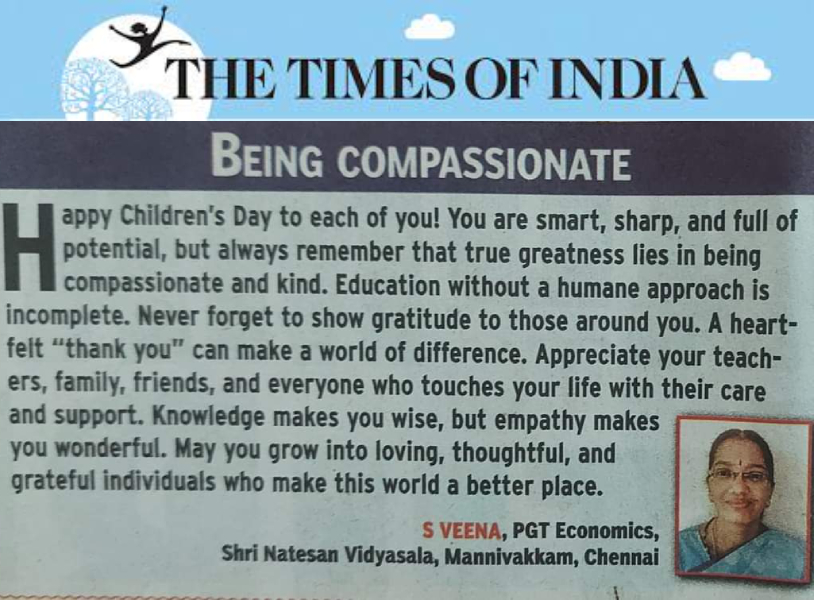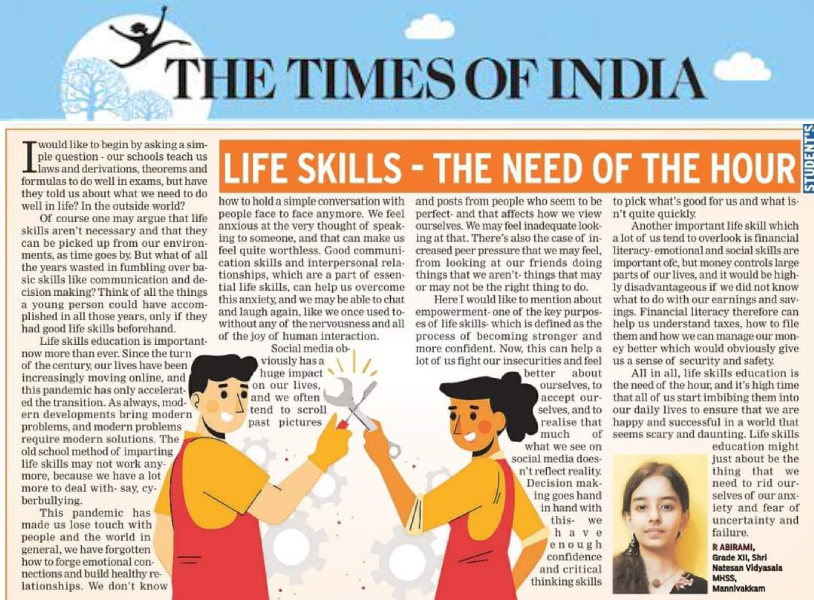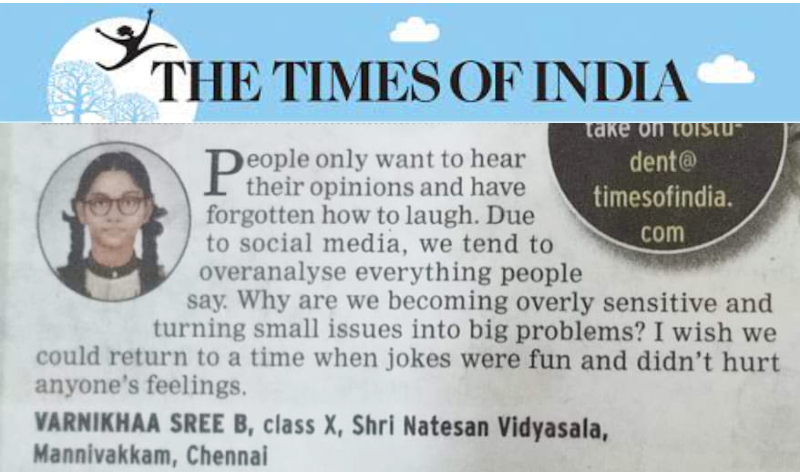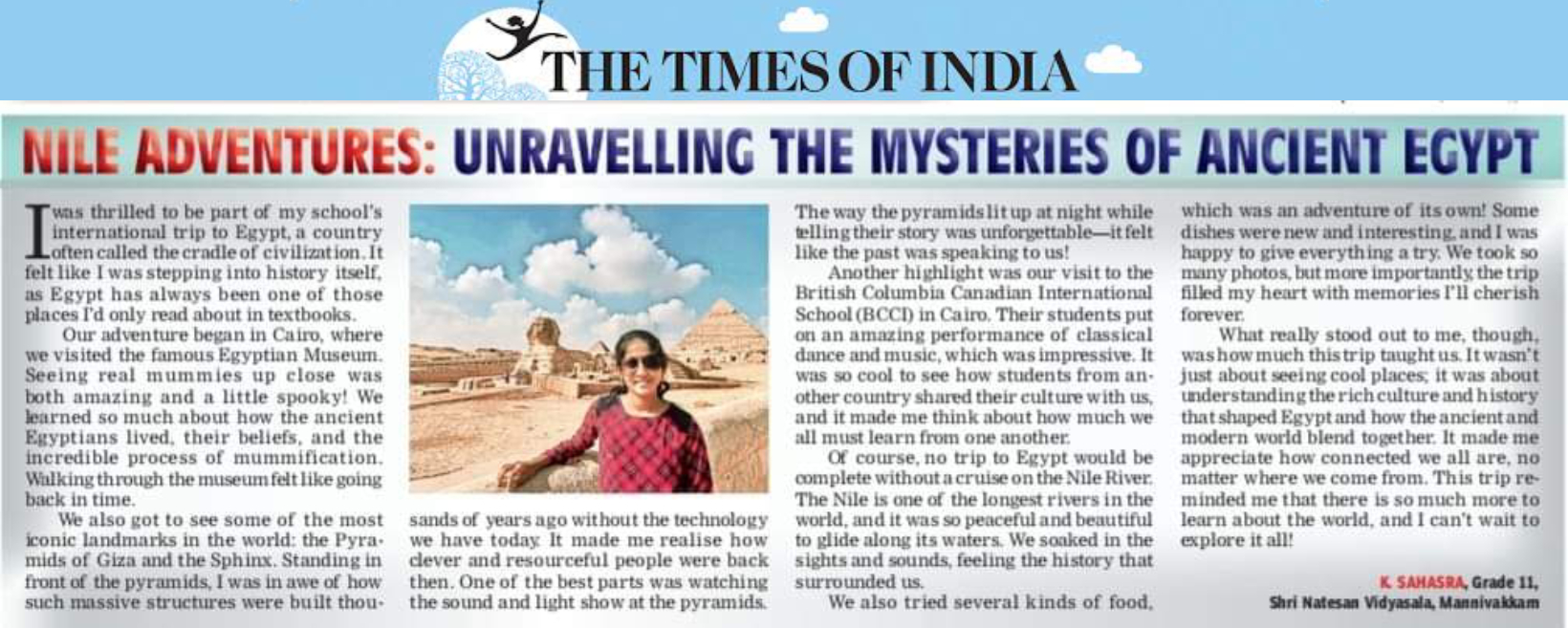#
FROM STAGNATION TO MOMENTUM: SHIFTING GEARS IN THE CLASSROOM
- Times of India
I
was a regular Tuesday morning, one of those days when the rhythm of the school felt predictable. I walked into my physics class, the lesson plan neatly or ganized in my mind. Today's topic was Kin ematics a subject I loved teaching because of the sheer beauty of motion it captured. I was confident, maybe even a little compla cent, believing the session would glide as smoothly as the equations we'd discuss. But teaching is a funny thing. Just when you think you're in control, the students remind you that learning is a two-way street.
We started with Galileo's experiments, moved through Newton's laws, and eventu ally reached inertia. I explained how objects resist changes in motion, how they cling to their current state unless acted upon by an external force. I paused to ask, "Does this make sense?" The usual chorus of nods fol lowed until a quiet voice from the second row asked, "Ma'am, does inertia apply to the mind too?"
Iblinked, momentarily thrown. Before I could respond, a cheeky voice from the back chimed in, "That's called intellectual inertia!" The class erupted in laughter, and I couldn't help but smile. That moment was a spark-a challenge to step beyond the text- book. I leaned into the laughter and said. "You're absolutely right. Let's talk about mental inertia."
I began with an example they could all relate to. "Have you ever stared at your math textbook, unable to start solving a problem. even though you know you must? Or felt too tired to get out of bed, even though you know a morning jog would energize you?" Heads nodded in agreement, and a few giggles escaped. "That's mental inertia," I said. "Just like an object at rest needs a push, our minds sometimes need a nudge to move forward."
I shared my own story "When I was in college, I hit a wall during my final year Every subject felt like a mountain, and I convinced myself I couldn't climb it. Then one day, my professor handed me a small book of poems. He told me, 'When your mind feels stuck, feed it something different. It was strange advice, but I read one poem a day. Slowly, I felt my energy return not because I mastered my syllabus overnight, but because I gave my mind a new path to follow The students listened intently; their usual chatter replaced by a quiet focus. I pressed on. "The good news is, breaking men tal inertia doesn't always require grand ges tures. Sometimes, it's as simple as taking a five-minute walk, doodling in your notebook, or talking to a friend. The key is to remember that feeling stuck is temporary You have the power to move forward, no matter how heavy the resistance feels."
A hand shot up. "Ma'am, is this why you ask us to write reflec tions on Fridays?" I smiled. "Exactly Writing helps you process your thoughts, shift gears, and see the road ahead more clearly It's one way to keep your mind in motion."
As the bell rang, I wrapped up with a final thought. "Remember, life isn't just about solving physics problems or scoring marks. It's
about learning to move-physically, men tally and emotionally. And every time you overcome inertia; you discover a new part of yourself. So, when you feel stuck, take that first small step. Trust me, momentum will follow"
The class filed out, but a few lingered. One student shyly said, "Ma'am, I've been feeling stuck lately I think I'll try drawing again." "Good idea," I replied, my heart swelling with pride. That day, I left the class-
room with a deeper sense of purpose. Kinematics wasn't just about motion anymore-it had become a metaphor for life. And in that realisation, I found my own momentum, ready to inspire and be inspired.
ANANDHI MANI,
Principal (High and
Higher Secondary)
Shri Natesan Vidyasala, Mannivakkam, Chennai
#
BEING COMPASSIONATE

- Times of
- India
Happy Children's Day to each of you! You are smart, sharp, and full of potential, but always remember that true greatness lies in being compassionate and kind.
Education without a humane approach is incomplete. Never forget to show gratitude to those around you. A heartfelt "thank you" can make a world of difference. Appreciate your teachers, family, friends, and everyone who touches your life with their care and support.
Knowledge makes you wise, but empathy makes . you wonderful. May you grow into loving, thoughtful, and grateful individuals who make this world a better place. S VEENA, PGT Economics, Shri Natesan Vidyasala, Mannivakkam, Chennai
#
LIFE SKILLS - THE NEED OF THE HOUR

- Times of
- India
I would like to begin by asking a simple question our schools teach us laws and derivations, theorems and formulas to do well in exams, but have they told us about what we need to do well in life? In the outside world?
Of course one may argue that life skills aren't necessary and that they can be picked up from our environ- ments, as time goes by. But what of all the years wasted in fumbling over basic skills like communication and decision making? Think of all the things a young person could have accomplished in all those years, only if they had good life skills beforehand.
Life skills education is important now more than ever. Since the turn of the century, our lives have been increasingly moving online, and this pandemic has only accelerat- ed the transition. As always, modern developments bring modern problems, and modern problems require modern solutions. The old school method of imparting life skills may not work any more, because we have a lot more to deal with- say, cyberbullying.
This pandemic has made us lose touch with people and the world in general, we have forgotten how to forge emotional con- nections and build healthy relationships. We don't know
how to hold a simple conversation with people face to face anymore. We feel anxious at the very thought of speak ing to someone, and that can make us feel quite worthless. Good communication skills and interpersonal relationships, which are a part of essen tial life skills, can help us overcome this anxiety, and we may be able to chat and laugh again, like we once used to without any of the nervousness and all of the joy of human interaction.
Social media obviously has a huge impact on our lives, and we often tend to scroll past pictures
and posts from people who seem to be perfect- and that affects how we view ourselves. We may feel inadequate look- ing at that. There's also the case of increased peer pressure that we may feel, from looking at our friends doing things that we aren't- things that may or may not be the right thing to do.
Here I would like to mention about empowerment-one of the key purposes of life skills which is defined as the process of becoming stronger and more confident. Now, this can help a lot of us fight our insecurities and feel better about ourselves, to accept our selves, and to realise that much what we see on social media doesn't reflect reality. Decision making goes hand in hand with this we have enough confidence and critical thinking skills to pick what's good for us and what isn't quite quickly.
Another important life skill which a lot of us tend to overlook is financial literacy-emotional and social skills are important ofc, but money controls large parts of our lives, and it would be highly disadvantageous if we did not know what to do with our earnings and sav- ings. Financial literacy therefore can help us understand taxes, how to file them and how we can manage our money better which would obviously give us a sense of security and safety.
All in all, life skills education is the need of the hour, and it's high time that all of us start imbibing them into our daily lives to ensure that we are happy and successful in a world that seems scary and daunting. Life skills education might just about be the thing that we need to rid ourselves of our anxiety and fear of uncertainty and failure.
R ABIRAMI, Grade XII, Shri Natesan Vidyasala MHSS,
Mannivakkam
#
I wish we
could return to a time when jokes were fun and didn't hurt
anyone's feelings.

- Times
- of India
People only want to hear their opinions and have forgotten how to laugh. Due to social media, we tend to overanalyse everything people say.
Why are we becoming overly sensitive and turning small issues into big problems?
I wish we
could return to a time when jokes were fun and didn't hurt
anyone's feelings.
VARNIKHAA SREE B, class X, Shri Natesan Vidyasala,
Mannivakkam, Chennai
#
NILE ADVENTURES: UNRAVELLING THE MYSTERIES OF ANCIENT EGYPT

- Times of
- India
I was thrilled to be part of my school's international trip to Egypt, a country often called the cradle of civilization. It felt like I was stepping into history itself, as Egypt has always been one of those places I'd only read about in textbooks.
Our adventure began in Cairo, where we visited the famous Egyptian Museum. Seeing real mummies up close was both amazing and a little spooky! We learned so much about how the ancient Egyptians lived, their beliefs, and the incredible process of mummification. Walking through the museum felt like going back in time.
We also got to see some of the most iconic landmarks in the world: the Pyramids of Giza and the Sphinx. Standing in front of the pyramids, I was in awe of how such massive structures were built thousands of years ago without the technology we have today It made me realise how clever and resourceful people were back then. One of the best parts was watching the sound and light show at the pyramids.
The way the pyramids lit up at night while telling their story was unforgettable-it felt like the past was speaking to us!
Another highlight was our visit to the British Columbia Canadian International School (BCCI) in Cairo. Their students put on an amazing performance of classical dance and music, which was impressive. It was so cool to see how students from an other country shared their culture with us, and it made me think about how much we all must learn from one another.
Of course, no trip to Egypt would be complete without a cruise on the Nile River The Nile is one of the longest rivers in the world, and it was so peaceful and beautiful to glide along its waters. We soaked in the sights and sounds, feeling the history that surrounded us.
We also tried several kinds of food.
which was an adventure of its own! Some dishes were new and interesting, and I was happy to give everything a try. We took so many photos, but more importantly the trip filled my heart with memories I'll cherish forever.
What really stood out to me, though, was how much this trip taught us. It wasn't just about seeing cool places, it was about understanding the rich culture and history that shaped Egypt and how the ancient and modern world blend together. It made me appreciate how connected we all are, no matter where we come from. This trip re- minded me that there is so much more to learn about the world, and I can't wait to explore it all!
K SAHASRA, Grade 11, Shri Natesan Vidyasala, Mannivakkam
ADVENTURES ACROSS BORDERS: A JOURNEY THROUGH BRUNEI AND SINGAPORE
- Times of
- India
I was beyond excited to be part of our school's international trip this year, where we visited Brunei and Singapore. It felt like a dream come true to explore new countries with my friends and teachers. Brunei, though a small country, had so much to offer! We explored beautiful mosques that looked like something out of a fairytale, with in- tricate designs and peaceful sur- roundings. One of the highlights was visiting Laksamana College of Busi- ness, where we got a glimpse of how students' study in a different part of the world. But my favourite part of Brunei was Kampung Ayer, also known as the "Venice of the East." It's the world's largest floating village, with houses, schools, and even mosques built on the river. It felt magical to see people living in such a unique way, so close to nature. The rainforests and national parks were stunning too, reminding me of how important it is to protect nature and appreciate its beauty.
Then we flew to Singapore, which felt like stepping into the future! Everywhere we went, there were tall sky- scrapers, beautifully designed parks,and such clean streets. We visited amazing places like Gardens by the Bay, where giant trees lit up the night sky, and the Skypark with a view that made me feel like I was on top of the world. Sentosa Island was full of excitement, especially the 'Wings of Time' show,which left us all amazed. Visiting Madame Tussauds was super fun too, as we got to take pictures with the wax figures of celebrities!
One of the coolest parts of the trip was Changi Airport. I never thought an airport could be so beautiful! The waterfall inside Jewel was breathtaking, and it felt like I was in a magical forest. This trip wasn't just about having fun, though we did that a lot by taking endless pictures and trying delicious food. It taught me so much. I learned about the history and culture of dif- ferent places, but more than that, I learned the importance of respecting other traditions and being open to new experiences. I also real- ized how lucky we are to see and learn from different parts of the world, and how important it is to protect the environment we live in. This trip will stay with me forever-not just for the sights we saw but for the life lessons I'll carry with me. V. JEYA VARSHINI, Grade 11, Shri Natesan Vidyasala, Mannivakkam TRAVEL DIARY
COUPLET CAPSULE FOR LIFE!
- Times Of
- India
Life's journey often brings us to detours, dead ends, crossroads, and rough paths, leaving us unsure of our next steps. Thirukkural, the time- less Tamil classic, offers a guide to navigating these challenges. Each couplet provides clear direction on living a purposeful life, helping us avoid failure, sorrow, disappointment, and negativity that can slow our progress.
Bharathi Baskar's writing in Thirukkural with the Times NIE breathes fresh life into this ancient wisdom. By weaving real-life experiences with historical insights, she makes these age-old truths relevant to modern readers.
Her engaging style presents each couplet as a "couplet capsule"-a blend of wisdom and contemporary perspective, making Thirukkural's insights relatable and accessible. This column is a must-read for anyone seeking inspi- ration and guidance to move forward in life.
ANANDHI MANI, Principal, Shri Natesan Vidyasala, Mannivakkam, Chennai
#
The imperfect inspiration
- Times Of
- India
I visited a school as a guest speaker on Mental Health Day. The children asked unfiltered questions and expressed their true selves with no inhibition. They genuinely sought solutions. This helped me introspect about my own thoughts and perceptions about the world. I realized that despite the age gap, our thoughts were not very different. In our roles as teachers and adults, it's crucial to stress that, like physical health, mental well-being is equally important for children and young adults. We must continuously remind them of the significance of their mental health and provide guidance on navigating the complexities of life.
Friendship choices can be compared to selecting the right ingredients for a recipe. Just as we carefully choose ingredients to make a delicious dish, we should choose friends who add positivity and support to our lives. High lighting examples of support ive friendships can help young minds understand the importance of surrounding themselves with the right people.
when we're unsure of a route, seeking help from a counselor or trusted adult is a sign of strength when navigating life's challenges. In essence, as responsible adults, we must convey the importance of mental health through relatable examples and provide guidance to help children and young adults make informed choices, build supportive relationships, and seek help when needed. This empowers them to lead mentally healthy lives in our ever evolving world, much like maintaining
a well-functioning vehicle.
Dr GAYATHRI RAMACHANDRAN, Correspondent and Chief Principal, Shri Natesan Vidyasala, Mannivakkam, Chennai
Become the best at what you do
Dr GAYATHRI RAMACHANDRAN, Correspondent and Chief Principal, who was interviewed by The Times of India
- Times of
- India
HOW HAS THE SCHOOL EVOLVED SINCE ITS INCEPTION?
We have grown from a school of 80 students
and 8 teachers at the time of inception to 3500+ students and 180 staff members now, in 2021. It's been 26 years of constant growth in multiple streams. We have constantly tried to stay ahead of the curve in terms of getting the best books with the latest syllabus. We have encouraged students to perform in sports; to write; to explore space research, and many more. We want to see holistic growth, where conventional growth is accompanied by non- conventional, extra-curricular growth.
Your message to childrenI would tell children to identify what they good at, and work on becoming the best at that. Want to become a journalist, an athlete, or a physicist? Make sure you constantly put time and effort into that. These days, there is more awareness amongst parents that there are multiple ways to succeed in life, and there are established pathways to ensure that. So it's not still a time where you'll have to become only engineers or doctors any field is fine, provided the necessary endeavour is applied.
HOW ARE YOU BLENDING INTERNATIONALISM IN THE CURRICULUM?
The vision to provide the best to students, forethought to make NATESANITES Global Citizens, meticulous planning and impeccable work to give international exposure to the stu dents and staff, the execution behind every international trip to few European countries, South Korea, Taiwan, China, Malaysia, Sri Lanka to name a few, international interaction with schools across the Globe, Taiwan, Srilanka, France, USA to name a few- all this makes our school truly a school bringing International dimensions.
The Boy Who Made Me Think
- Times of
- India
Recently, I watched Sir Ken Robinson's TED Talk, "Do Schools Kill Creativity?" and it left a deep impression on me. Robinson's message was clear: traditional education often stifles creativity by focusing too much on subjects like math and science, pushing students into narrow paths. As an educator, this resonated with me. In India, while there's some progress in em- bracing the arts, there's still a long way to go. The big question is: Are we really let- ting our students explore their full potential, or are we still boxing them into paths we believe are the only ways to succeed?
For the longest time, I believed that success was found only through institutions like the IIMs and IITS. Academic excellence was everything to me. But then, my perspective shifted after an encounter with a student who chal lenged my beliefs. This young boy wasn't a regular student, and his grades reflected that. Frustrated, I asked him how he ex- pected to get into college with such low scores. His response surprised me. He calmly said, "Ma'am, I'll manage to score decent marks, but I'm passionate about painting. I'll find my way and carve a niche for myself." That conversation was a turning point for me.
One of the biggest ways schools can kill creativity is by sticking too closely to standardized curriculums. When we focus too much on rote learning and standardized testing, we limit students' ability to think creatively and
standing, and belief in their potential to succeed, no matter the path they choose.
Dr GAYATHRI RAMACHANDRAN, Correspondent and Chief Principal, Shri Natesan Vidyasala, Mannivakkam, Chennai.




